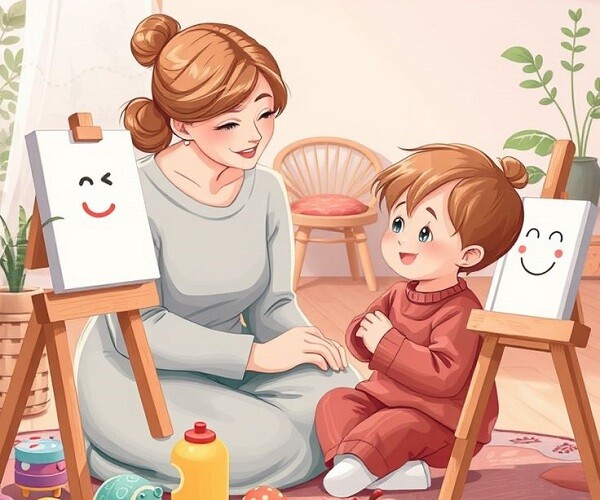In fact, education is not about parents solving problems for their children, but about instilling the courage to face challenges in a healthy way. Therefore, the role of parents is not to become a “shield”, but to nurture a resilient mindset.
When parents support their children with subtle love, they will be able to rise strongly amidst the storms of life.
Psychologists share five simple yet important action guidelines from a child’s psychological perspective, to raise children with strong hearts, bright eyes, and a relaxed attitude towards life.


Learn to “squat”: Listen to your child, don’t judge
“Dad, they called me a coward.”
Eight-year-old Hao Hao tightly gripped his school bag and bowed his head as he spoke to his father.
That day, he was mocked by his classmates for being timid, and even hid in the bathroom, afraid to go to class.
Instead of blaming his son for being fragile or telling him to “ignore them”, his father took him for a walk around the neighborhood over the weekend.

Image source: Mom Junction.
Halfway through their walk, Hao Hao became weary and said, “They always call me a coward…” His father wiped the sweat from his forehead, squatted down, and asked, “Do you think you’re brave?” Hao Hao shook his head.
His father pointed to the steep mountain path and said: “But today, you didn’t ask for my help at all. Isn’t that brave?”
On their way back, Hao Hao suddenly turned and said: “Next time if anyone laughs at me, I’ll tell them about my mountain-climbing experience – I’m not a coward!”
Although he had to endure the injustice of being mocked by his classmates, he had met a father who could “squat” and look his child in the eye.
But how many children, like Hao Hao, want to confide in their parents, only to be shut down with phrases like “Why are you crying?” Many parents want to “fix” their child’s emotions, but they forget that when a child speaks up, what they need is not a judge to decide right from wrong, but a teammate who can understand their feelings.
Psychological research has found that a child’s trust in their parents is often hidden in seemingly “meaningless” things.
When a child says, “My classmates don’t play with me anymore”, what they’re really asking is, “Am I not worthy of love?”

Listen to your child, don’t judge.
Suggested actions for parents
Allocate about 10 minutes of “pure listening” every day: Turn off your phone, look your child in the eye, and don’t interrupt, even if they say something inappropriate.
Replace questioning with curiosity: For example, “Why did you fail the test?” can become “Which part of the test did you find most challenging?” Or, “Why did you fight?” can be reframed as “You must have felt wronged at that time, right?”
Use “your feelings” instead of “my reasons”: If your child expresses “I don’t want to go to school”, don’t immediately respond with “You have to go to school”. First, ask “Are you facing any difficulties at school?”
True education is never about pruning from above, but about sitting down and watering the roots by listening.

Cultivate “indifference”: Give your child time
“Mom, I really can’t memorize this poem…”
Five-year-old Doudou tightly hugged his poetry cards, tears streaming down his face and soaking the paper.
His mother stared at a message in the parents’ group chat: “Other children have been able to recite
As a result, Doudou cried himself to sleep that night, and the next day, he refused to touch any poems.
Such pressurizing scenes occur almost daily.
A 12-year longitudinal study at Harvard University found that children who grow up in a highly pressured environment for a long time will experience inhibited development in their prefrontal cortex, which is responsible for creativity and emotional regulation.
Trying too hard is not nurturing a genius but creating a “worry wrapper.”
When parents use “other people’s children” as a yardstick, what they’re measuring is not their child’s potential, but their own anxiety.

Give your child time to develop.
Suggested actions for parents
Allocate time for development: Set aside half a day of free time each week, allowing your child to decide whether to daydream, play in the mud, or watch ants move…
Use positive words to encourage: For example, “You finished your homework 10 minutes faster than yesterday. Super efficient!” Or, “Although the answer is wrong, your steps are much clearer than last time!”
Sign a “non-degeneration agreement” with your child: For example, “If your test scores improve by 5 points and you learn to tie your shoelaces, we’ll celebrate!”
True education is not about forcing your child to sprint, but about accompanying them to discover their own period of growth.
Some children are like winter flowers, blooming only in the cold winter, while others are like sunflowers, always facing the light.
When they’re no longer pressured to keep up with “standardized models”, their unique talents and passions will quietly flourish.

Utilize “weakness technique”: Guide your child to become a problem-solving partner
“Mom, where’s my band-aid?”
Five-year-old Duoduo rushed into the kitchen, holding up his finger, and his mother exclaimed, “Oh no, I cut myself while chopping vegetables!” Duoduo immediately forgot about his minor injury and stood on tiptoe to look at his mother’s “wound.”
His mother pretended to say, “Can you help me wash the vegetables? Otherwise, we’ll be hungry by lunchtime”. Duoduo didn’t say a word, brought a small chair, and started washing the vegetables while muttering to himself, “I’m more useful than a band-aid!”
From then on, every day he would ask, “Mom, do you need my help today?”
Such scenes, like a good medicine, have cured the “child-centered” disease for many families.
Therefore, sometimes parents need to show “weakness” to teach their children how to bravely handle problems.

Guide your child to become a problem-solving partner.
Suggested actions for parents
Pretend to be “clueless” in daily life: For example, “My memory is so bad. Do you remember where I put my keys?” Or, “I can’t assemble this Lego set. Can you be the commander and guide me?”
Turn commands into “SOS signals”: For instance, instead of “Hurry up and do your homework!”, try “Mom doesn’t know how to solve this question either. Can you teach me?” Or, instead of “Hurry up and wash your hands for dinner!”, say “Done! I’ll turn down the heat. Can you help me watch the pot for two minutes?”
Replace generic praise with specific thanks: For example, “Today, you mopped the floor cleaner than I could!”
Parents should not, out of love, let their children live like “greenhouse flowers.”
When children continuously experience the feeling of being needed by completing tasks like finding keys, teaching parents problem-solving skills, and sharing household chores, the confidence in their hearts becomes more precious than high test scores.

Set “gentle boundaries”: Love has limits and clear rules
“Mom, can I play for another 10 minutes?”
Seven-year-old Duoduo tightly hugged her tablet and refused to let go, begging and crying.
Her mother relented and said, “Okay, just 10 minutes”. But 30 minutes later, Duoduo was still playing the game. Her mother suddenly lost her temper and shouted, “Why are you so stubborn? I’m going to ban you from playing!” She snatched the tablet and threw it onto the sofa.
Duoduo was so scared that she burst into tears. The next day, she secretly hid the tablet in her bag and played with it in the school bathroom.
This tug-of-war scenario exposes the dilemma in the education of many families.
Indulgent parents: Rules can be changed at will, and children learn that “tears are the master key.”
Authoritarian parents: Rules are very rigid and strict, and children either pretend to obey but don’t actually follow them, or they’re suppressed and become “obedient children.”

Love has limits and clear rules.
Educator Li Meijin once said, “Love without rules is called indulgence, and rules without love are violence.”
A 10-year longitudinal study by the University of London found that children from families with clear and gently enforced rules had 37% higher emotional stability.
Family rules are not cold chains but a map that gives children a sense of security, knowing that “the place that teaches me is also my safe haven.”
Suggested actions for parents
Establish a “family constitution”: For example, no one uses their phones during mealtimes, and everyone takes turns sharing something interesting from their day.
Be a gentle enforcer when rules are broken: For example, “I know you want to play the game (empathy), but you haven’t finished your homework yet (rule), so you can’t play today (consequence). No scolding or shaming, just be gentle but firm.
Hold a “family council” once a month: For instance, let your child propose new rules (e.g., getting a pet, adjusting allowance). The whole family will vote on the decision, sign it, and post it on the fridge or another visible place.
True rules are not rulers in the hands of parents but lighthouses guarded by the whole family.
When children know that the consequence of crossing the line is not their parents’ anger but a natural price, they will respect the rules instead of fearing them.




































